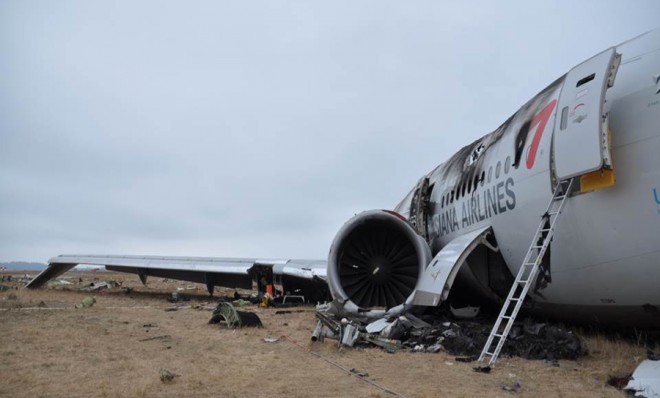What happens to your luggage if you survive a plane crash?
Be sure to leave your paintings and priceless manuscripts at home

A free daily email with the biggest news stories of the day – and the best features from TheWeek.com
You are now subscribed
Your newsletter sign-up was successful
Despite three high-profile plane crashes in the last month alone, your odds of dying in an aerial mishap are very, very low — about 11 million to 1. To be clear, you're more likely to perish by lightning strike, or from an infection stoked by flesh-eating bacteria.
And even if your plane is one of the unlucky few to suffer a freak accident, the survival rate for passengers once the aircraft hits the ground tips squarely in your favor: About 95 percent, according to statistics from the National Transportation Safety Board.
Once you're on the ground, though, there's still work to be done, including getting out of the plane as fast as possible. Which is why there was some armchair criticism of the surviving passengers of Asiana Airlines Flight 214, after many felt compelled to grab their belongings once the plane hit pavement.
The Week
Escape your echo chamber. Get the facts behind the news, plus analysis from multiple perspectives.

Sign up for The Week's Free Newsletters
From our morning news briefing to a weekly Good News Newsletter, get the best of The Week delivered directly to your inbox.
From our morning news briefing to a weekly Good News Newsletter, get the best of The Week delivered directly to your inbox.
In fact, one of the Asian flight's passengers noted an "eerie sense of calm" among the survivors when it came time to evacuate. "I grabbed my bags as soon as it stopped," he wrote on Sina Weibo. "My wife was very calm — she even picked up the scattered stuff on the ground."
But what about the bags that are left behind on the plane? According to The Consumerist, the process can get a little messy. After an investigation by authorities, passengers will have to file a written request to be reimbursed within 45 days, with a maximum compensation of $3,300 for destroyed belongings. The airline won't reimburse you for everything, however:
Among other things, the airline will not compensate passengers for "money, negotiable papers, securities, irreplaceable business documents, books, manuscripts, publications, photographic or electronic equipment, musical instruments, jewelry, silverware, precious metals, furs, antiques, artifacts, paintings and other works of art, lifesaving medication, and samples." [The Consumerist]
Of course, when the rest of the plane is spouting flames around you, standing in the aisle to grab your rolling bag from the overhead compartment is an obvious no-no that puts other peoples' lives at risk. One guy on the U.S. Airways flight that landed in the Hudson River in 2008 who tried to grab his luggage was quickly put in his place by other passengers.
But what happens when evacuees are sent to the hospital — supposedly without their travel documents, IDs, passports, health insurance, etc. How is all that handled?
A free daily email with the biggest news stories of the day – and the best features from TheWeek.com
That responsibility falls on the airline, which, let's remember, requires detailed information on all its passengers beforehand. Still: It might not be a bad idea to keep your ID or passport on your person when you fly, just in case you crash land anywhere (say, a foreign country) that isn't a desert island.
-
 Minnesota's legal system buckles under Trump's ICE surge
Minnesota's legal system buckles under Trump's ICE surgeIN THE SPOTLIGHT Mass arrests and chaotic administration have pushed Twin Cities courts to the brink as lawyers and judges alike struggle to keep pace with ICE’s activity
-
 Big-time money squabbles: the conflict over California’s proposed billionaire tax
Big-time money squabbles: the conflict over California’s proposed billionaire taxTalking Points Californians worth more than $1.1 billion would pay a one-time 5% tax
-
 ‘The West needs people’
‘The West needs people’Instant Opinion Opinion, comment and editorials of the day